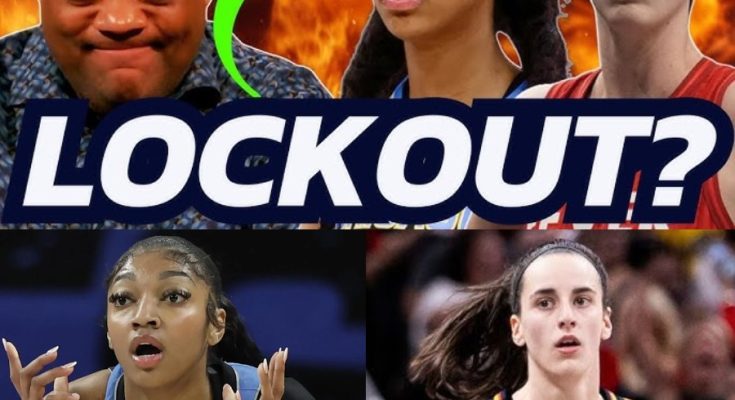Angel Reese Calls for Change: WNBA Star Threatens Strike Over Equal Pay Disparity
In a bold and unprecedented move, WNBA rising star Angel Reese has publicly voiced her frustration over the league’s ongoing pay disparity compared to their male counterparts in the NBA.
The LSU standout, who transitioned into the WNBA with high expectations and immense popularity, is taking a stand against what she describes as a long-standing injustice in women’s professional basketball.
As the discussion surrounding equal pay in sports gains momentum, Reese’s threat to strike has ignited a new wave of advocacy and debate in the basketball world.
A Growing Movement for Equal Pay in Women’s Sports

The conversation surrounding pay equity in professional sports has been a contentious issue for years.
While the NBA generates billions in revenue and compensates its players with multimillion-dollar contracts, WNBA athletes continue to earn significantly lower salaries.
Reese, one of the most vocal figures in this movement, has made it clear that she is unwilling to accept the status quo.
Reese’s public statements echo the frustrations of many female athletes who believe that their contributions to the sport deserve fair financial recognition.
“We put in the same hours, we dedicate ourselves just as much, and we inspire the next generation,” Reese said in a recent interview.
“Yet, we’re still fighting for wages that allow us to sustain a living without having to play overseas in the off-season. That’s not fair.”
The Numbers: How Wide is the Pay Gap?
The disparity between WNBA and NBA salaries is staggering.

The maximum base salary for WNBA players in 2024 is approximately $250,000, while the minimum salary for an NBA player exceeds $1 million.
Superstars like LeBron James and Stephen Curry earn annual salaries in excess of $40 million, in addition to lucrative endorsement deals.
In contrast, WNBA players often have to supplement their income by playing in international leagues, where they can earn more than their WNBA salaries.
This financial imbalance has been a long-standing issue, and despite recent improvements—such as the WNBA’s collective bargaining agreement in 2020 that increased base salaries and provided better benefits—the gap remains significant.
Reese’s demand for equal pay is part of a broader call for structural changes within women’s professional basketball.
Reese’s Rising Influence and Advocacy
Angel Reese has quickly become one of the most influential figures in women’s basketball.
With a passionate fan base, a strong social media presence, and an ability to spark discussions on major issues, her voice carries weight.
Her call for pay equity is not just about her own career but about securing a better future for generations of female athletes to come.
“I’m not just speaking for myself—I’m speaking for every little girl who dreams of playing professional basketball,” Reese emphasized.
“We deserve better, and we’re not going to stop until we get it.”

Reese’s willingness to take a stand places her in the same category as other prominent female athletes who have fought for equal pay, such as Megan Rapinoe and Serena Williams.
By leveraging her platform, Reese is pushing for conversations that extend beyond the basketball court and into the broader sphere of gender equality in sports.
Could a Strike Force Change?
One of the most significant aspects of Reese’s stance is her willingness to consider a strike if meaningful progress is not made.
Historically, labor strikes in sports have been used as leverage to force leagues and governing bodies to address financial and structural inequities.
If WNBA players were to organize a strike, it would send a powerful message to league officials, sponsors, and fans that they are no longer willing to tolerate the existing conditions.
Such a move could also draw increased media attention and public support, amplifying the pressure on decision-makers to implement necessary changes.
However, striking is a complex and high-risk strategy. With many players already struggling financially, missing games and paychecks could be a difficult decision.
The success of a potential strike would likely depend on solidarity among players and backing from influential figures within and outside the sports industry.
The Role of Sponsorship and Media Coverage
A key factor in the WNBA’s financial situation is revenue generation through sponsorships and media rights deals.
:max_bytes(150000):strip_icc():focal(768x199:770x201)/Angel-Reese-WNBA-081924-tout-9e9c9f44cf17491890b96c6c3cc29288.jpg)
Compared to the NBA, the WNBA has historically received less media coverage and sponsorship investment, which directly impacts league revenue and, consequently, player salaries.
In recent years, there has been a push for greater visibility of women’s sports, with increased broadcasting deals and endorsement opportunities.
Reese and other top players are urging sponsors to invest more in the WNBA, emphasizing that with proper funding and media representation, the league can grow exponentially.
“Sponsors and networks have a role to play in this,” Reese stated.
“If you invest in us the way you invest in men’s sports, you’ll see that women’s basketball has an audience, it has talent, and it deserves to be supported.”
Public Reaction and Industry Response
Reese’s stance has sparked widespread reactions from fans, fellow athletes, and sports analysts.
While many have applauded her bravery in speaking out, others argue that equal pay in the WNBA can only be achieved if the league’s revenue increases substantially.
Former NBA players have weighed in on the conversation, with some offering support and others emphasizing the business realities of professional sports.
“The WNBA has made progress, but there’s still a long way to go,” said a former NBA champion. “If players like Angel Reese keep pushing, we might see real change sooner than later.”
What’s Next for Angel Reese and the WNBA?
Reese’s demands for equal pay and her willingness to take a stand could mark a turning point in the fight for financial equity in women’s basketball.
Whether or not a strike materializes, her advocacy is keeping the conversation alive and placing pressure on league executives to respond.
The WNBA has yet to release an official statement on Reese’s comments, but it is clear that the issue is not going away anytime soon.
As more players join the movement, the league may face increasing pressure to implement policies that ensure fair compensation for its athletes.
For now, Angel Reese remains at the forefront of this critical fight, using her platform to challenge the status quo and demand a future where WNBA players are compensated fairly for their talent and dedication.
The coming months will be crucial in determining whether the league responds with meaningful reforms or continues to face mounting criticism from players and fans alike.



